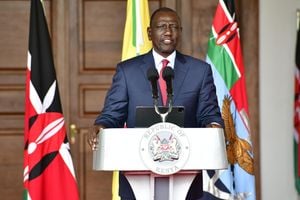
President William Ruto (left) and his first batch of Cabinet nominees.
President William Ruto on Friday, July 19, reappointed six of the sacked Cabinet secretaries when he named the first batch of 11 nominees, in a move analysts described as a “dare-devil gamble”.
There had been a general expectation that the President would consider picking technocrats following demands by Kenyans—including by the youth who led close mass protests. There was also a demand for new faces in the Cabinet after Dr Ruto sacked his entire Cabinet on July 11, only retaining Prime Cabinet Secretary Musalia Mudavadi.
Dr Ruto had repeatedly announced his plans to form a “broad-based government” through consultation with other political players, including the opposition Azimio la Umoja One Kenya Coalition led by Raila Odinga.
Although the list is not exhaustive, the named individuals are majorly drawn from two regions—Rift Valley and Mt Kenya—that heavily voted for the Kenya Kwanza administration in the 2022 General Election. There had been complaints that the previous Cabinet was largely skewed to benefit the two regions.
Picking technocrats and having the face of the country in the new Cabinet was meant to calm the nation and assuage the protesting youth, who have been pushing for better governance.
President Ruto retained Mr Aden Duale (Defence), Prof Kithure Kindiki (Interior), Ms Soipan Tuiya (Environment, Climate Change and Forestry) and Ms Alice Wahome (Lands, Public Works, Housing and Urban Development) in the dockets they held previously.
Former Trade CS Rebecca Miano has been nominated to replace Justin Muturi as Attorney-General. Ms Miano is set to become the first Woman Attorney General in Kenya if approved by the National Assembly. Ex-Energy CS Davis Chirchir has been nominated to take over the Roads and Transport ministry, which was previously under Mr Kipchumba Murkomen.
In his five new picks, the President nominated Mr Julius Migos Ogamba to replace Ezekiel Machogu in the Education ministry. Mr Migosi, 52, was Mr Machogu’s running mate for Kisii governor on Dr Ruto’s United Democratic Alliance (UDA) in 2022. They lost to Governor Simba Arati.
He also named Dr Debra Mulonga Barasa (Health) to replace Susan Nakhumicha, Dr Andrew Karanja (Agriculture) to replace Mithika Linturi, and Margaret Nyambura Ndung’u (Information, Communication and the Digital Economy) to replace Eliud Owalo.
Eric Muuga, a 32-year-old civil engineer, has been nominated to take over the Water, Sanitation and Irrigation docket from Zacharia Njeru. He is the youngest of the nominees.
Analysts and lawyers argued that there was no legal provision barring the President from reappointing some of the CSs, but raised the possibility of a political storm. Some of the dismissed ministers, however, believe they were casualties of the sins of some of their colleagues accused of corruption, display of opulence and incompetence.
Prof Macharia Munene, a political analyst and university lecturer, described the return of the six CSs as a daring move by the President. He said the decision could be to test acceptability by Kenyans before returning more sacked ministers.
“It is kind of a dare-devil thing. There is some element of a gamble, a power play. He is still reaching out to Raila and the rest to see who else he can bring back depending on how the public will receive these,” said Prof Macharia. “The question now is whether the Gen Z, who are behind the protests, will accept them.”
Prof David Monda, a university lecturer, said that Dr Ruto’s decision to reappoint over half of his Cabinet shows he is going for continuity rather than the radical change Gen Z had demanded. “I don’t think this will satisfy the Gen Z,” he said.
He, however, noted that the political currents seem to be moving past the youthful social movement.
“More traditional status quo forces led by politicians, working within the traditional channels, are looking to address Gen Z concerns through political deals and compromise. I think this is a gamble Ruto had to take. He had to split the opposition and bring traditional politicians on board to save his administration from the enormous pressure it was facing.
“He has also moved to check the Gen Z movement by putting pressure on donors like the Ford Foundation. He has also used the brute force of the police and intelligence to bring down perceived leaders of Gen Z. Time will tell where this youth movement goes next. It seems they are fast being outflanked,” said Prof Monda.
But in his address at State House, the President said he had started the process of forming a new, broad-based Cabinet to assist him in driving the “urgently needed and irreversible transformation of the country”.
“While the events of the past month have caused tremendous anxiety, concern and uncertainty, the crisis has presented us with a great opportunity, as a nation, to craft a broad-based, and inclusive citizen coalition for national transformation and progress, made up of Kenyans from all walks of life,” President Ruto said at State House Nairobi yesterday.
“It cannot be denied that our nation has been in a crisis caused by multiple and complex factors. Neither can we turn away from recognising that the opportunity before us is greater than the crisis. Together, we have a chance to take our country where we all want it to be and make our nation the Kenya we all want,” he told the country.
Mr Duale told the Nation that his reappointment reflects the President’s and Kenyan’s trust and confidence in his ability to advance the country’s agenda, especially the national security.
“I am ready and willing to present myself to the National Assembly’s relevant committee for vetting and public scrutiny. If the National Assembly approves me, my priority is to continue with sole duty to lead the Kenya Defence Forces (KDF) top leadership to protect the safety and security of our nation and citizens, continue with KDF modernisation of equipment, welfare of our KDF rank and file members in terms of housing, health care and education of their children,” said Mr Duale.
Impeachment
Former Law Society of Kenya President Nelson Havi on Thursday equated the dismissal of the CSs to impeachment of governors, suggesting that the President should not reappoint them.
“The dismissal from office of the Cabinet secretaries means that they are ineligible to hold any public office forever: appointive or elective. They are in the same category as impeached Governors or Judges found unsuitable to serve. That is the law,” said Mr Havi.
Lawyer Ahmednasir Abdullahi also supported this assertion, saying there was need for serious reflection and judicious deliberation over the matter.
“So, in dismissing his Cabinet William Ruto was satisfied that their conduct, performance in office or their omissions rose to a constitutional level or threshold that warranted their dismissal.
Grave constitutional omission
“Having satisfied himself on the attainment of the constitutional threshold he dismissed them. President Ruto can't reappoint any member of the cabinet because their dismissal under the constitution implied a grave omission or commission. That grave constitutional omission or commission hasn't been erased or addressed in the past week,” said Mr Abdullahi.
The senior counsel said reappointing any dismissed CS will engulf President Ruto in a fresh political crisis and unparalleled constitutional challenges.
But constitutional lawyer Bobby Mkangi said there is no legal provision barring the President from reappointing any of the dismissed ministers. He said they will, however, be vetted anew by the National Assembly.
He cited Article 75 (3) that provides that “a person who has been dismissed or otherwise removed from office for a contravention of the provisions mentioned in clause (2) is disqualified from holding any other State office.”
The article provides that such an individual has to be subjected to the applicable disciplinary procedure for the relevant office for them to them to be barred from holding any other public office.
“The stated clause 2 specifically mentions Articles 76 (financial probity of State officers), 77 (restriction on activities of State officers; appointed ones not holding office in political parties, or two jobs) or 78 (citizenship and leadership).
“Unless other information relating to these is provided and processed determinately, the CSs can still be re-nominated, and appointed, subject to vetting by the National Assembly,” said Mr Mkangi.








